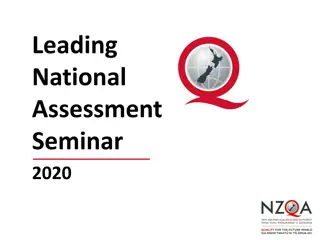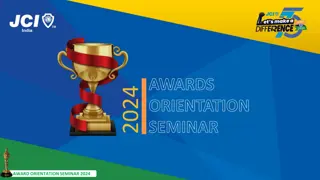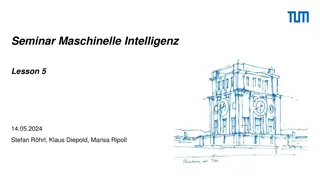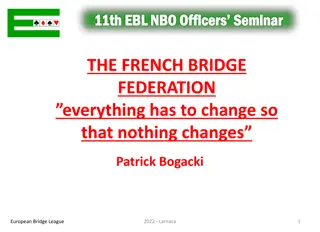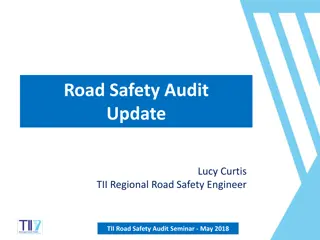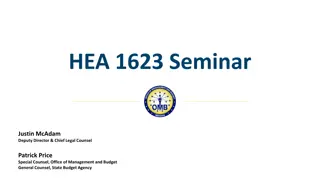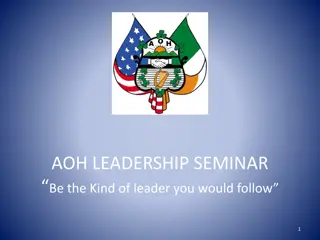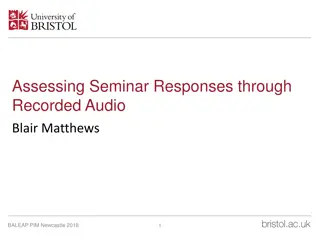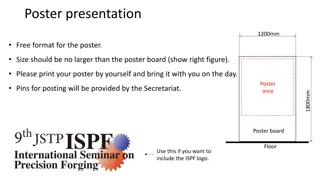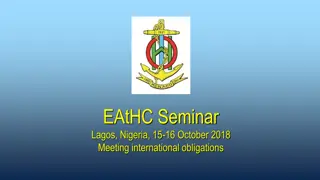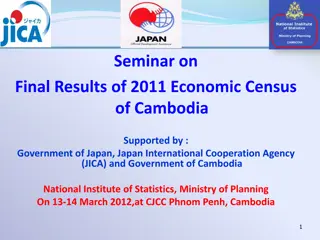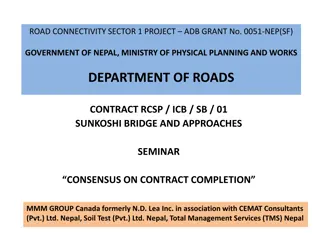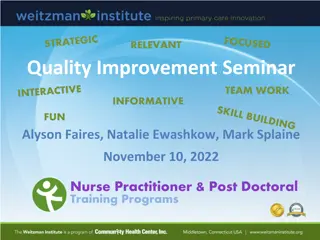
Listening Tasks for Identifying Speaker Attitude and Detail
Enhance your listening skills with tasks focusing on identifying speaker feelings, attitudes, opinions, purposes, and more. Improve your comprehension with these exercises.
Download Presentation

Please find below an Image/Link to download the presentation.
The content on the website is provided AS IS for your information and personal use only. It may not be sold, licensed, or shared on other websites without obtaining consent from the author. If you encounter any issues during the download, it is possible that the publisher has removed the file from their server.
You are allowed to download the files provided on this website for personal or commercial use, subject to the condition that they are used lawfully. All files are the property of their respective owners.
The content on the website is provided AS IS for your information and personal use only. It may not be sold, licensed, or shared on other websites without obtaining consent from the author.
E N D
Presentation Transcript
(263 ) 161 61% 180 160 140 120 100 1 65 25% 80 60 22- 8% 40 15 6% 20 0 0-15 16-30 31-45 46-60
250 205 200 150 126 105 100 75 73 68 57 55 50 17 9 0 1 0 < 10 11-15 16-18 19-20 /
Listening Task 1 (multiple choice) the focus is on identifying speaker feeling, attitude, opinion, purpose, function, agreement between speakers, listener course of action, gist and detail. Task 2 (sentence completion) the focus is on identifying specific information and stated opinion. Task 3 (multiple choice) the focus is on identifying attitude, opinion, gist, detail, speaker feeling, purpose, function and agreement between speakers.
, 1, . 6 70 : 65 62 61 60 1.B 2.C 3.B 4.B 5.A 6.B 50 40 32 30 28 20 13 10 2 0 1 2 3 4 5 1
, 2, .8 90 84 80 7. accountant 8. astronomer 9. conflict(s) 10. adaptability 11.electric fence(s) 12. corridor(s) 13. maps 14. captivity 70 61 60 50 40 35 35 34 30 20 14 10 0 1 2-3 4-5 6-7 1
7. he reminded me more of an accountant (explorer; ecountant) 8/ dreamed of becoming an astronomer 9/ postgraduate studies looked particularly at the way elephants and humans have come into conflict. (relations; collaboration) 10/ what amazes Bakul is their adaptability (adoptability; adopt ability; adapt ability; adaptability; memory; problems; terms) 11/ they will break down electric fences (wires; fanses; electricity; water course; one bridge; wide; canal; tasks) 12/ he calls corridor(s) (waterfall coridors; solutions) 13/ plots the information on maps (monitoring; radiocolor; forest oficces; chips; crops) 14/ he says there is also a need to keep some in captivity, to provide a better understanding that is crucial for their management in the wild. (/the/wild; habits; activity; a wild)
, 3, . 6 80 75 70 15. C 16. B 17. A 18. D 19. B 20. C 60 60 50 46 38 40 28 30 20 13 10 3 0 1 2 3 4 5 1
General tips Use the time before the recording starts to read the questions and try to predict the topic. Underline the important words in the questions. You will hear the information you need in the same order as the questions. Don t choose an answer just because you hear the words in the recording. The answer to a question will have the same meaning as the recording but may use different words.
General tips (2) Try to identify the stressed syllables and words in a listening text (the ones which carry the message) rather than tying to listen for every single syllable. Practise deducing meaning of unknown words (part of speech, meaning from the context). Practise differentiating homophones, homonyms and numerals.
When preparing for ANY listening task, use AUDIOSCRIPTS !!!
Sentence completion Read the instructions and find out what the conversation will be about. Think about the information you will be listening for (a day, a time, a price, etc.) You might hear two possible answers. Listen carefully to choose the right one.
Reading Task 1 (multiple matching) focus on detail, opinion, attitude, specific information Task 2 (multiple choice) focus on detail, opinion, attitude, tone, purpose, main idea, implication, text organization features (exemplification, comparison, reference)
, 1, . 13 160 142 140 1. C 2. A 3. D 4. B 5. A 6. D 7. C 8. D 9. B 10.D 11.A 12.C 13.B 120 100 80 61 60 41 40 20 11 8 0 0 1-2 3-6 7-10 11-12 1
, 2, . 7 120 99 100 14. D 15. A 16. B 17. D 18. C 19. D 20. A 80 64 60 51 38 40 20 9 2 0 1 2-3 4-5 6 1
Word-spotting assuming that an option must be correct simply because it contains a word that is also in the text. (From Cambridge English: First for Schools Handbook p.8; 2010 edition) PARAPHRASING!
How to teach to read attentively? Use your pencil while reading (both texts and tasks) it s a must! While checking the answers, ask your students to prove them with the text (the correct answers as well)
General strategies How we deal with the task depends on task type. Any text should be read at least twice, the first reading being skimming. Find the evidence for your answer in the text.
Use of English Task 1 (4-option multiple-choice cloze) focus on vocabulary Task 2 (key word transformation) focus on grammar, vocabulary, collocation)
, . 10 120 106 1. C 2. A 3. D 4. C 5. D 6. C 7. B 8. A 9. C 10.B 100 95 80 60 51 40 20 8 3 0 0 1-2 3-4 5-7 8-9 1
, .10 120 112 100 96 80 60 41 40 20 7 0 0 0 1-2 3-4 5-7 8-9 1
11. having flu Lucy managed to pass (the flu; she; getting well) 12. agreement had been reached about/on (was reached; has been reached; announcer reached on) 13. order to avoid leaving/an attempt to avoid leaving (intent to avoid leaving; case to avoid ; avoid of ) 14. far too expensive for Colin to (far too expensive to; far more ; too far expensive ) 15. brother s account of (brothers account; brother to account me) 16. little/not much likelihood of seeing OR (that) we will see (low likelihood ; a small likelihood ; likelihood ; no likelihood for us to see; a little likelihood ) 17. have been imposed as a (were imposed; was imposed ; imposed as the; are imposed) 18. for your help/the help you gave me (without your help; if you did not help me; if you wouldn t help me; with your help) 19. was caused by (the) flooding/a/the flood/floods (caused lots of hard work) 20. does not matter (at) what ( which; on what; doesn t matter of)
, 348 18-20 ; 11% 0 ; 21% 16 ; 13% 14 ; 14% 6-10 ; 22% 12 ; 20%
1. ( .3 ) ; ; ; . 120 100 80 60 40 20 0 3 2 1 0 1 64 101 109 74 1
2. ( .2 ) (3 ); ; . 1 160 140 120 100 80 60 40 20 0 2 1 0 1 128 140 6 1
3. - ( .2 ) , ( ), , ); 2+); ( - ). 1 180 160 140 120 100 80 60 40 20 0 2 1 0 1 33 159 82 1
4. ( .2 ) ; ( , ). 1 160 140 120 100 80 60 40 20 0 2 1 0 1 147 119 8 1
5. ( .1 ) ( ); . 1 300 250 200 150 100 50 0 1 0 1 250 24 1
1. Our leisure activities and hobbies have been changed dramatically by technology. To what extent do you agree with this?
No.1 Nowadays our world is full of various technologies. Some people Believe that they bring up changes to our lives. Some people don t share their opinion and say that modern technologies i e can t change any thing and I can understand their point of view. Firstly, I don t think that we don t live in the world our parents lived in. Education is mostly the same, we read the same books inspite of using idad for finding information most of the time. In school we write with our pens and pencils. Though we have ta(la?)-cops. We still go in for the same sports, wich any parents used to go in for. Or course, I can t say that human race can t feel any impact of I Pads and Iphones, but it doesn t change our lives that much. It just makes them easier. By the way, there are only about ten or twenty new hobbies, which appeared with modern with modern technologies and that amount is so small, that it is ridiculous to say that our hobbies have been changes dramatically. In conclusion I d like to say that though we can see some changes in our life which are caused by modern technologies, basicly, our lif is the same thing as live of previous generation.
No. 2 Everyone wants to relax from their work and escape their arduous lifestyles, at least for some time. That is where a great variety of hobbies comes. However, the ways of spending freetime nowadays differ from ones in the past to a large extent. Diverse reasons may account for it. For instance, the drastically development may appear to be both positive and negative. First, technologies influence our social activities a lot. There is a plenty of social networks in existence so people all around the world are connected and are capable of communicating easily. That increase in global communication provides the friendship among all the countries, despite their political courses, which is definetely a positive effect. Second, there is also a strong impact on our lifestyles which is brought by the growing popularity of hi-tech items. Nowadays, the popularance is far less engaged in sport due to a substantial number of varied gadgets that they owe. That may trigger the wordly spread declining of the health and, thus, may cause worse quality of life. All things considered, from my point of view, the development of technologies affects our activities a lot. There is a positive effect, like socialization, as well as the negative one, for instance, deteriorating of populance health.
No. 3 The 21stcentury is believed to be the century of the technological and industrial progress. It has influenced all spheres of our lives greatly. Without any doubt the way we pass the time has changed, too. In my opinion, hobbies people have today are not as fantastic as they seem to be. Some of them may prove harmful to our health. For instance, playing computer games is a popular tendency. However, it is common knowledge that sitting in front of the computer screen can do a lot of harm to our eyesight. Moreover, plenty of games involve violence and blood. They can teach a child to be cruel to others. Hobbies, that should actually be encouraged in children, are becoming less and less popular. For example, reading. I think, the reason why this is hapening is that playing computer games is a lot easier, as you do not have to think much. What is more, it is less time-consuming. All in all, I strongly believe that nothing can substitude for reading books. From my point of view, older ways of passing time are better and more cognitive, than the new ones.
No.4 Technology has had a tremendous impact on the society over the course of human existence. Many things have changed. Our leisure activities and hobbies are no exception as many people say. Others don t agree with that point of view. Personally, I believe that the way we spend our spare time is completely different compared to what was before. First, we tend to use computers, smartphones and tablets. For most of the activities we parttake in because they give us endless amount of information and a more convenient way to store it. Secondly, with the development of technology every thing has become more accessible. The Internet provides us with any kind of information you would need for free. For instance, if you do not know how to do something, you can search it online and find help with almost anything. Lastly, with new gadgets people introduce new hobbies like 3D-modelling, shooting movies and many others. In conclusion, the technology is very important and it has changed many aspect of the society and people in general. Our hobbies and leisure activities have changed drastically.
THANK YOU! Any questions?

